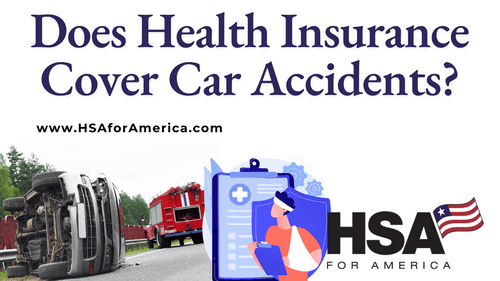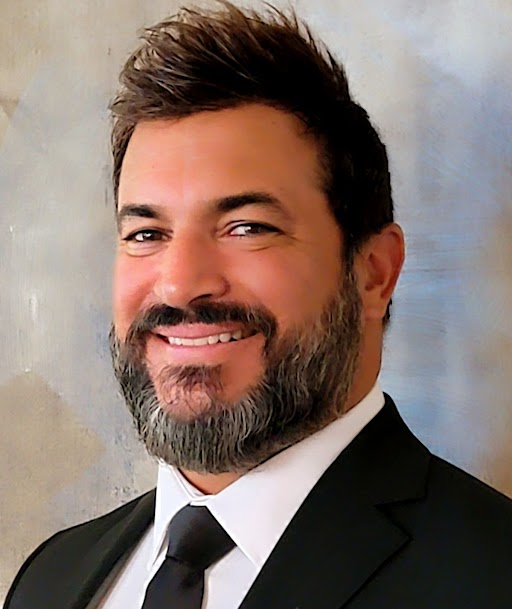Car accident insurance plays a crucial role in covering medical expenses after an accident, but many wonder if health insurance also applies.

While health insurance can cover injuries from car accidents, there are important limitations and exceptions you should know—especially if you’re injured on the job. For that reason, it’s a good idea to carry other forms of insurance protection. These other forms of coverage can fill in the gaps that health insurance by itself or auto insurance doesn’t cover.
Let’s take a look at some of these different circumstances.
1.) Injured On the Job
Each state has its own workers’ compensation laws, which are designed to handle job-related accidents.
If you’re injured in a car accident while working for an employer, your employer’s workers’ compensation insurance is supposed to cover treating your injuries, medical transportation, and follow-up care.
Workers’ compensation insurance will also pay you a part of your salary to compensate you for time off work during your injury – something ordinary health insurance doesn’t do.
Normally, your own personal health insurance policy will not cover workplace injuries and illnesses that are covered under workers’ compensation, at least until after your workers’ compensation claim is settled.
Note: According to the Disability Council of America, workers’ compensation insurance covers only five percent of disabilities. So it’s very important to maintain your own health plan, even if you are covered under a workers’ compensation plan at work.
LEARN MORE: Why You Need Health Insurance Even If You’re Healthy
Compare Pricing on the Best Insurance Plans Available
2.) Medical Coverage Under Car Insurance
In case of injury, the car owner’s auto insurance policy plays a big role in ensuring injuries get treated as well.
Here’s a look at the various types of insurance normally included in a standard auto insurance policy:
| Type of Coverage | What It Covers |
|---|---|
| MedPay (Medical Payments Coverage) | Covers medical expenses for the driver and passengers, no matter who caused the accident. |
| Personal Injury Protection (PIP) | Pays medical bills and lost wages, regardless of fault. |
| Other Driver’s Liability Coverage | If another driver is at fault, their insurance can pay for damages and medical bills. |
| Uninsured/Underinsured Motorist (UM/UIM) | Helps if the at-fault driver has no insurance or only very limited coverage. |
Note: The state minimum liability coverage is normally not adequate to protect the policy owner against any but the most minor car accidents. If you’re injured, and the only coverage available is the state minimum, you could potentially sue the car owner or whoever caused the accident for damages. But that doesn’t mean you’ll actually recover a dime.
And it could be years before you get a judgment or settlement.
Again, that’s why it’s important to have your own personal or workplace group health plan.
TIP: Accident or hospital indemnity insurance provides affordable cash benefits.
This pairs well with a health sharing plan that has a higher Member Responsibility Amount (MRA). It keeps monthly costs low.
3. What If the Other Driver Is Uninsured?
Uninsured drivers are more common than you think.
1 in 8 drivers in the U.S. lacks insurance, according to the Insurance Research Council. And many of the rest only carry the state minimum liability insurance, which doesn’t go far.
If the at-fault driver is uninsured, you’ll be on your own for your expenses for a good while, and probably for good. Yes, you can sue the uninsured or underinsured driver. But in most cases, these uninsured drivers have little or no assets for you to collect in any settlement or judgment.
Until then, you’ll have to cover your medical expenses out of your own resources and insurance policies.
That’s where your auto insurance carrier’s Uninsured/Underinsured Motorist (UM/UIM) coverage can protect you.
HOW TO PROTECT YOURSELF AGAINST UNINSURED/UNDERINSURED MOTORISTS
| First Check Your Car Insurance policy. | Ensure you have UM/UIM coverage in your policy. |
|---|---|
| Second Get a Supplement with Accident Coverage. | Purchase accident or hospital indemnity insurance. |
| Third Review Any Health Sharing Plans. | Confirm any exclusions for car accidents. |
| Lastly, Set Up Emergency Funds. | Plan for unexpected out-of-pocket costs. |
Accident insurance or hospital indemnity coverage can provide extra protection.
4. Health Insurance Limitations
Health insurance doesn’t cover everything.
Common Gaps
- Long-Term Care: Medical insurance doesn’t cover long-term skilled nursing or assisted living care for permanent injuries. Neither does Medicare. For that coverage, you need long-term care insurance.
- Lost Income: Health insurance pays medical bills (after your deductible and coinsurance). But it doesn’t compensate you for lost wages if you lose your income. Disability insurance replaces lost wages if you can’t work after the accident, and you don’t qualify for workers’ compensation, or workers’w compensation income payments are inadequate.
- Deductibles, Copays, and Coinsurance. You could have significant out-of-pocket costs for injuries sustained in a car accident, even with medical insurance.
For example, in 2025, the maximum out-of-pocket costs for an ACA-qualified health plan are $9,200 for individuals, and $18,400 for families. If you have a family, a state minimum liability insurance policy with just $10,000 or $15,000 in coverage may not be enough by itself to even cover your deductible.
How to Cover What Health Insurance Doesn’t
To protect yourself and fill in the gaps that medical insurance by itself doesn’t pay, contact a Personal Benefits Manager and discuss adding the following types of coverage:
- Long-term care insurance. Pays a daily benefit for nursing homes, assisted living, or other forms of long-term care.
- Disability income insurance. Pays cash to replace lost income if you are injured or sick and can’t work.
- Hospital or Accident Indemnity Insurance. This is very affordable coverage that quickly pays a cash lump sum in the event of a qualifying accident. You can use this to cover your deductible, pay coinsurance costs, replace lost income, pay a caretaker, or anything else you need as you recover.
These policies also make great employee benefits, if you’re a business owner.
Consider setting up a Section 125 plan and letting your workers purchase this coverage by payroll deduction. Their payments are exempt from payroll taxes. So you can help them obtain this valuable protection while reducing your own tax burden at the same time.
Learn More: The Small Business Owner’s Guide to Setting Up a Section 125 Cafeteria Plan
5.) Health Sharing Plans and Accident Coverage
Health sharing plans can also help you pay for treatment costs after an injury in a car accident.
They also generally offer more flexibility when it comes to choosing your own doctor. Most also pay 100% of costs after you meet your initial unshareable amount (which functions similarly to a health insurance deductible.
However, health sharing plans may exclude or limit sharing for things like motorcycle accidents or extreme activities like auto racing or motorcycle racing.
Always check your health sharing plan for exclusions and coverage limits.
Compare Pricing on the Best HealthShare Plans Available
Conclusion: Does Health Insurance Cover Car Accidents?
The short answer is YES but it has limits.
To stay fully protected:
- Coordinate car and health insurance policies.
- Add accident, long-term care, and disability insurance.
- Get UM/UIM coverage for uninsured drivers.
- Review health sharing plans for exclusions.
Being prepared reduces financial stress after an accident.
Take the time to review your coverage now!
We can help with that with a free consultation where one of our Personal Benefits Managers can find the right plans that meet your needs and save you money.
For Further Reading:

Hi! I’m Mike Montes, and I’m one of your Personal Benefits Managers. I like working with HSA for America because we’re creating solutions to healthcare problems. Our focus on money-saving alternatives like HSA plans and health sharing programs, and the variety of health share programs we offer, are what set us apart. Read more about me on my Bio page.


